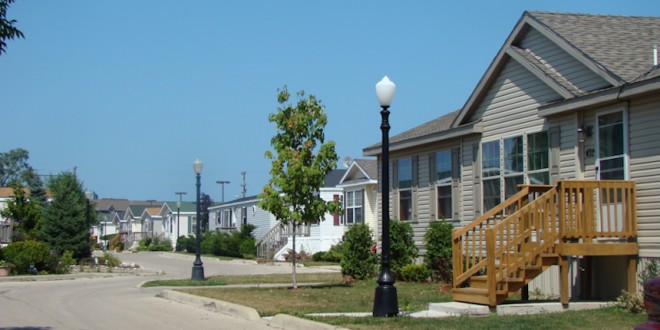“The federal bank fraud charges represent another indignity for Richard Klarchek, who was swamped by bad debt a decade ago and wound up in bankruptcy.” So said Crain’s Chicago Business in a story no other major media outlets have yet reported.
More than a decade has passed since Richard J. “Dick” Klarchek was hit by the housing-financial-economic firestorm that was later dubbed the “Great Recession.” Dick Klarchek and his attorney Joseph Duffy were contacted for comments in reaction to the Crain’s story. A reply from Klarchek himself came via email that thanked MHProNews for our interest in his circumstances.
More from that email from the accused shortly.
“I haven’t spoken to anyone from then [the Capital First Realty era]…JR hired a few at MHPI,” said a message from a former Capital First Realty (CFR) manager to MHProNews.
Among those contacted for reaction to the report was John Rogosich – or “JR.” More from Rogosich and others will follow the main takeaways from Crain’s August 7, 2020 narrative.
“A Chicago real estate investor who amassed a Midwest mobile-home park empire before going bankrupt is facing criminal allegations that he cheated lenders that loaned him tens of millions of dollars.
Richard Klarchek, former chairman and CEO of Chicago-based Capital First Realty, used phony tenants at some properties to boost their occupancy and inflate their rental income, one of multiple schemes he used to defraud his lenders, according to charges federal prosecutors filed yesterday in U.S. District Court in Chicago.
Klarchek repeatedly provided false financial statements to banks including Bank of America, MB Financial and TCF Bank, both to obtain new loans and to maintain good standing with existing ones, prosecutors allege.
Efforts to reach Klarchek were unsuccessful. The attorney representing him in the criminal case, Joseph Duffy, did not return phone calls.
The charges against Klarchek represent another indignity for a man, now in his mid-80s, who had what some perceive as the trappings of success more than a decade ago, including a Lake Geneva mansion, a wife less than half his age and enough money to donate $10 million for a new library named after him at Loyola University Chicago. The main source of his wealth: a portfolio of 18 Midwest mobile-home parks with 7,200 home sites.
But Klarchek’s business unraveled in 2010 amid a wave of foreclosure suits against Capital First’s properties, including Sterling Estates, a 744-site park in southwest suburban Justice. He filed for bankruptcy that year and battled for years in court with a bankruptcy trustee and lenders who accused him of hiding his assets from creditors.
The Chapter 7 case finally ended in December 2017. Klarchek’s creditors received just $181,000 of the $140.5 million a bankruptcy judge said they were owed, a bankruptcy court document shows.
The bankruptcy case comes up in the federal charges against Klarchek. Prosecutors allege Klarchek concealed from the bankruptcy trustee his ownership of antique furniture that sold for about $23,500.
Klarchek defrauded lenders “by means of materially false and fraudulent pretenses, representations, and promises,” prosecutors write in an information filed in federal court.
The fraud included a $40.5 million mortgage Klarchek took out on the Justice property in 2003, according to the document. He instructed his employees “to prepare false rent rolls (for the property) that inflated rental income by including fictitious rental income from fictitious tenants and tenants who were not paying rent,” the document says.
Prosecutors allege that some of those phony tenants were actually Klarchek’s employees who didn’t live in Sterling Estates. Klarchek hiked their pay to cover their rent but then offset the increase by deducting it from their paycheck, according to the charges.
Klarchek provided false financial statements for June 2009 to Bank of America, which serviced the Sterling Estates mortgage, that included about 109 fictitious tenants and inflated the property’s income by nearly $120,000, the document says. He provided another statement for September 2009 including 97 phony tenants, inflating the park’s rental income by almost $125,000, prosecutors charge.
By making Sterling Estates’ financial performance look better than it really was, Klarchek could continue to meet a debt-coverage ratio required under his loan agreement, and avoid triggering provisions that would have allowed the bank to tighten its control over the property. It wasn’t enough: A Capital First venture that owned the park filed for Chapter 11 protection in May 2010, about two weeks after the property was hit with a foreclosure suit.”
##
The terminology errors are in the Crain’s original, as anyone familiar with Sterling Estates, Sunset Village or other CFR properties know that they were a far cry from the ‘mobile home parks’ from decades ago. Among the advancements that Klarchek implemented were upscale, highly residential manufactured homes, like the ones shown in the photos above and below.

The balance of the Crain’s story reflected his “$10 million dollar gift” to Loyola University for naming their new library the “Richard J. Klarchek Information Commons.” In 2018 the name was changed to “Loyola Information Commons” with few specifics as to the reasons why that name modification was made. Their full report is linked here.

Per Dick Klarchek…
Klarchek’s emailed reply to MHProNews declined specific comments from him or his attorney about the pending legal allegations at this time. But Klarchek’s email to MHProNews added some personal touches.
“Keep up the good work, you’ll go far. This is a crazy world we’re living in so we need more people like you! Great insight and a real American!
Stay covered to stay healthy,
My best to you and your family,
Dick”
As a disclosure, this writer provided contracted marketing services to Capital First Realty circa 2008-2010. The vision Klarchek had for transforming older so-called “mobile home parks” into upscale, appealing modern manufactured home communities in an urban setting were well known to this writer.
Those visionary points of his project are routinely missed by mainstream news reports such as Crain’s that tend to focus on the drama.
Klarchek’s emailed comments may reflect his being a periodic reader of MHProNews, which included “I hope things are well with you and I must say you are a talented, professional, hardworking person and you did an excellent job fo[r] us.”
Having worked with several members of the CFR staff, outreaches to former managers of Klarchek were made by MHProNews. Among them was John Rogosich, who simply said “Yes ,I have heard about news.” No further comment was offered. Rogosich’s LinkedIn profile excludes, for whatever reason, mention of his services to Capital First Realty (CPR).
Another CPR management-level individual invited to reflect on the aspirational aspects of the Klarchek plan for transforming older communities into desirable places for more upscale urban customers said the following.
“Dick tried to do all the things you described, but he counted on two truths which proved false in the Great Recession – 1. Real estate would always appreciate and 2 you could always refinance.
Those two truths which proved false were at the heart of the entire crash across the world, let alone at Capital First.”
A lender familiar through years of business dealings with CPR said in part the following, also off the record. “Hey Tony, … They sent me the Klarchek article since they know I [k]new him. I was a bit shocked as i never considered him to be a crook. We all knew he was flamboyant and pulled all the money out of his businesses to support his lifestyle.
Also, it seems strange that this took so long.” That observation about the years of delay in federal bank fraud charges may prove to be relevant as the legal proceedings develop.

MHProNews Analysis and Commentary
The legal process will of course play out and obviously whatever it is, it is. But this matter ought to draw attention to arguably larger problems, not just CFR related allegations.
While the circumstances may vary from CFR’s, it is worth noting that there are several troubling issues that have roiled and are ongoing in the manufactured housing industry in general, and the land-lease community sector more specifically. Some of those problematic issues involve far larger numbers of consumers in a fashion that may cross both civil as well as criminal law.
Some industry high rollers may think that as time has gone by, that they are ‘safe.’ Whatever the outcome of this specific CFR matter may be, this case could be viewed as a reminder to some in the industry who have arguably done far worse than what has been alleged in the report by Crain’s.
Given the numbers of former CFR team members who are still involved in the manufactured home industry, this story is likely to periodically resurface as legal investigations, interviews, and processes continue. MHProNews plans to monitor and report as warranted.
Stay tuned for more of what is ‘behind the curtains’ as well as what is obvious and in your face reports. That and more are all here, at the runaway largest and most-read source for authentic manufactured home “Industry News, Tips, and Views Pros Can Use” © where “We Provide, You Decide.” © ## (Affordable housing, manufactured homes, reports, fact-checks, analysis, and commentary. Third-party images or content are provided under fair use guidelines for media.) (See Related Reports, further below. Text/image boxes often are hot-linked to other reports that can be access by clicking on them.)

By L.A. “Tony” Kovach – for MHProNews.com.
Tony earned a journalism scholarship and earned numerous awards in history and in manufactured housing.
For example, he earned the prestigious Lottinville Award in history from the University of Oklahoma, where he studied history and business management. He’s a managing member and co-founder of LifeStyle Factory Homes, LLC, the parent company to MHProNews, and MHLivingNews.com.
This article reflects the LLC’s and/or the writer’s position, and may or may not reflect the views of sponsors or supporters.
Connect on LinkedIn: http://www.linkedin.com/in/latonykovach
Related References:
The text/image boxes below are linked to other reports, which can be accessed by clicking on them.
Whistleblower’s Documents on Lesli Gooch – Manufactured Housing Institute CEO – New Discoveries
Warren Buffett Would be Okay With Clayton Homes Losing Money, Says Kevin Clayton – But Why?



























